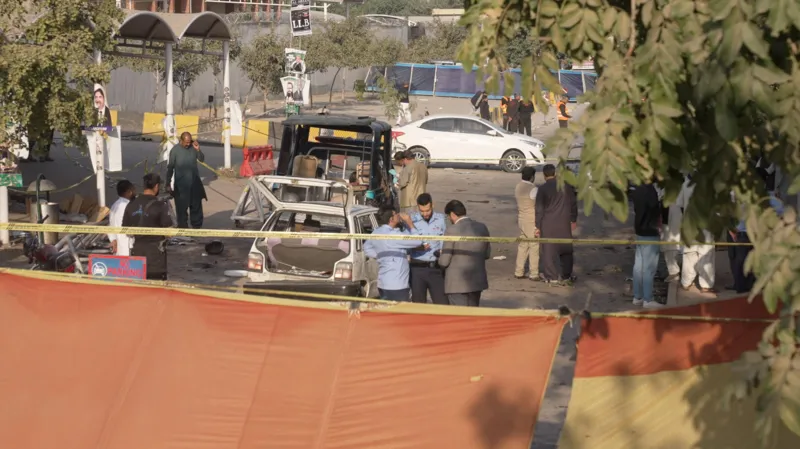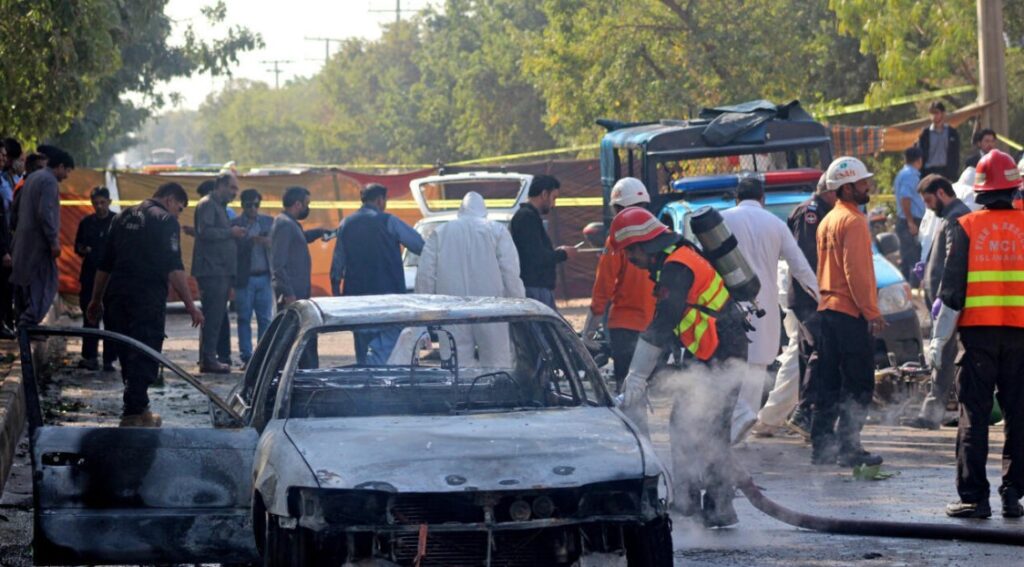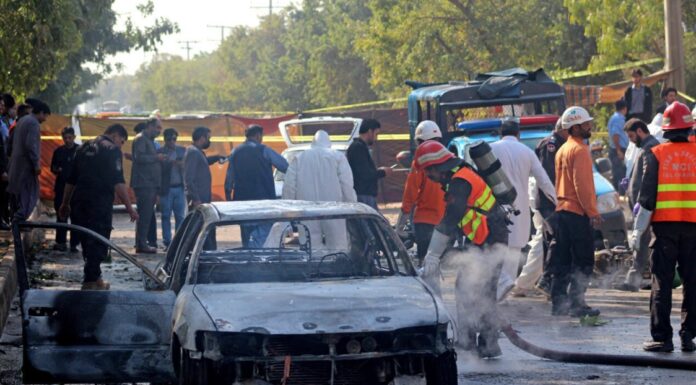The Islamabad suicide bombing attack has once again raised deep concerns about security and stability in Pakistan’s capital. On Tuesday, a tragic explosion near a district court in Islamabad claimed the lives of at least 12 people, leaving 27 others injured, according to Pakistan’s Interior Minister Mohsin Naqvi. What was intended to be a targeted attack inside the courthouse turned into a deadly blast just outside its entrance when the suicide bomber was unable to breach the main building.
This incident has not only shaken the families of those affected but also ignited renewed political tension and international accusations, adding emotional and diplomatic weight to an already tragic moment. As emergency services scrambled to save lives, lawmakers and citizens alike questioned how such an attack could occur in an area believed to be under heightened security.
This article provides a clear breakdown of what happened, who has claimed responsibility, the broader political implications, and how the nation is responding.

Understanding the Islamabad Suicide Bombing Attack
The Islamabad suicide bombing attack took place near the district courthouse, an area that typically contains police presence, lawyers, visitors, and detainees attending hearings. Authorities indicated that the attacker waited for up to 15 minutes before detonating the device near a police vehicle when it became clear they could not enter the court complex.
Footage from the scene captured burning vehicles, thick plumes of smoke, shattered windows, and emergency teams rushing to treat the injured. Witnesses described the aftermath as one of panic, confusion, and fear.
One lawyer, Rustam Malik, who was parking his car during the explosion, recounted:
“I heard a loud bang. It was complete chaos. Lawyers and people were running inside the complex. I saw two dead bodies lying on the gate and several cars on fire.”
Such eyewitness accounts highlight the suddenness of the attack and the terror unleashed in seconds.
Who Claimed Responsibility for the Attack?
Local media reported that Jumaat Ul Ahrar, a splinter faction of the Pakistani Taliban (TTP), claimed responsibility for the Islamabad suicide bombing attack. However, the situation became more complex when some journalists shared that the TTP central leadership denied involvement, distancing themselves from the incident.
This conflicting messaging has led to questions about:
-
Internal fractures within militant groups
-
Competing factions’ motives for claiming or denying attacks
-
The broader landscape of extremism in Pakistan
While Pakistan has faced militant violence for decades, major suicide bombings in Islamabad have become less frequent in recent years, making Tuesday’s blast particularly alarming for citizens who believed the capital had become safer.
Government Response and Political Tensions
Shortly after the Islamabad suicide bombing attack, Pakistani Prime Minister Shehbaz Sharif released a strong statement accusing extremist networks of being supported by India.
He described the incident as:
“Terrorist attacks on unarmed citizens of Pakistan by India’s terrorist proxies are condemnable.”
The Indian government, however, rejected these claims, calling them “baseless and unfounded.”
Such accusations have added diplomatic pressure between two nuclear-armed neighbors who have long held tense relations. At the same time, officials in Pakistan emphasized that their immediate priority is to identify the attacker and bring all collaborators to justice.
Pakistani President Asif Ali Zardari also condemned the incident, urging unity and resolve in the face of terror.
Broader Regional Context
The Islamabad suicide bombing attack occurred just one day after a deadly car explosion in New Delhi, India’s capital, which killed eight and injured several others. While India has not labeled that explosion a terror attack, the investigation has already been handed to an anti-terror agency.
Indian Prime Minister Narendra Modi stated:
“Those responsible will be brought to justice, no matter how deep the conspiracy runs.”
This coincidence of attacks in two major South Asian capitals has led analysts to question whether regional militant networks may be re-emerging or shifting their tactics.
How Rare Are Attacks in Islamabad Today?
Although Pakistan has seen suicide bombings in various regions over the years, Islamabad has been relatively calm compared to the early 2000s and mid-2010s, when bombings in markets, police stations, and public spaces were more frequent.
The last major suicide attack in Islamabad occurred three years ago, when a police officer lost his life and several others were injured. This sharp decline in attacks is attributed to:
-
Improved intelligence networks
-
Counter-terrorism operations
-
Strengthened border monitoring
However, Tuesday’s attack indicates that security vulnerabilities remain, especially in public or government-adjacent spaces.

Aftermath and Emergency Response
Of the 27 people injured, several remain under medical care. Hospitals in Islamabad are treating blast victims for burns, shrapnel wounds, and trauma-related complications. Authorities have also increased security around government buildings, court complexes, and transportation hubs to prevent further violence.
A police cordon remains in place around the blast site, as forensic teams analyze debris and surveillance footage.
Conclusion
The Islamabad suicide bombing attack is a tragic reminder that the threat of extremist violence continues to evolve. As Pakistan mourns the victims and begins its investigation, both national and international attention will remain focused on how authorities respond, whether the perpetrators are identified, and how regional political tensions continue to unfold.
For citizens, the attack strikes at the sense of security in everyday public spaces. For leaders, it raises difficult questions about intelligence gaps, diplomatic narratives, and the long-term stability of the region.

